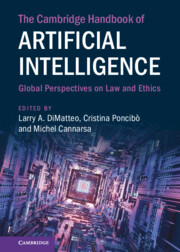Book contents
- The Cambridge Handbook of Artificial Intelligence
- The Cambridge Handbook of Artificial Intelligence
- Copyright page
- Contents
- Figures
- Contributors
- Foreword
- Preface
- Part I AI: Development and Trends
- Part II AI: Contracting and Corporate Law
- Part III AI and Liability
- Part IV AI and Physical Manifestations
- Part V AI and Intellectual Property Law
- Part VI Ethical Framework for AI
- Part VII Future of AI
- 23 AI Judges
- 24 Combating Bias in AI and Machine Learning in Consumer-Facing Services
- 25 Keeping AI Legal
- 26 Colluding through Smart Technologies
- 27 The Folly of Regulating against AI’s Existential Threat
- 28 AI and the Law
25 - Keeping AI Legal
from Part VII - Future of AI
Published online by Cambridge University Press: 28 July 2022
- The Cambridge Handbook of Artificial Intelligence
- The Cambridge Handbook of Artificial Intelligence
- Copyright page
- Contents
- Figures
- Contributors
- Foreword
- Preface
- Part I AI: Development and Trends
- Part II AI: Contracting and Corporate Law
- Part III AI and Liability
- Part IV AI and Physical Manifestations
- Part V AI and Intellectual Property Law
- Part VI Ethical Framework for AI
- Part VII Future of AI
- 23 AI Judges
- 24 Combating Bias in AI and Machine Learning in Consumer-Facing Services
- 25 Keeping AI Legal
- 26 Colluding through Smart Technologies
- 27 The Folly of Regulating against AI’s Existential Threat
- 28 AI and the Law
Summary
The chapter addresses the question of how to continue developing artificial intelligence (AI) without challenging and infringing legal norms, principles and values, represented by the current legal frameworks of liberal democratic societies. To answer this question, the chapter first of all briefly deals with the concept of legality (what it means to be legal in the age of disruptive technologies) and then relates it to two specific private law challenges: The first challenge is related to intellectual property law and is represented by the clash between trade secret protection of algorithms and the increasing public need for algorithmic transparency and explicability; the second challenge is related to consumer protection where the questions of liability and the shifting roles of the main stakeholders build the space for discussing who is who in building, developing and using AI.
- Type
- Chapter
- Information
- The Cambridge Handbook of Artificial IntelligenceGlobal Perspectives on Law and Ethics, pp. 383 - 394Publisher: Cambridge University PressPrint publication year: 2022



